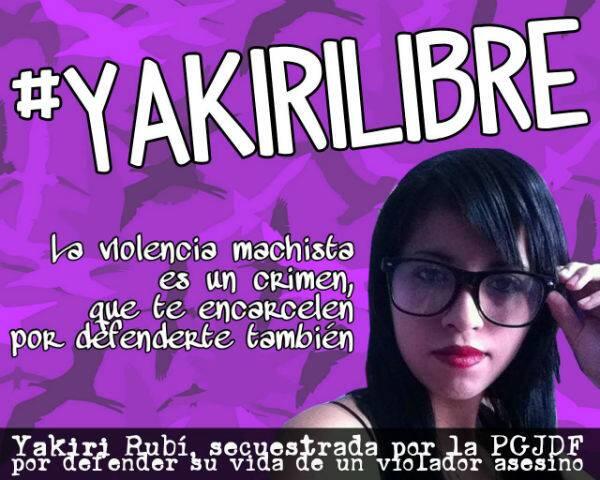
The case of Yakiri Rubio is a celebrated case in Mexico, which has received practically no attention in the United States or in the Anglophone press worldwide. That’s a shame, because Yakiri’s case articulates with cases in the United State, and with the more general situation of women’s safety and wellbeing.
In December, 20-year-old Yakiri was seized by two men, brothers, and taken to a hotel, where she was raped. Yakiri picked up a knife and struggled with her attackers. She struck one of the attackers in the neck, and he subsequently died of his injury. Clothes ripped, bleeding and bruised, Yakiri fled the hotel, found a police officer, and described what happened. She was taken to the police station. No one believed her. That night in the police station, she received no gynecological examination or any medical attention. No medication, no treatment, no nothing. Then Yakiri was booked for first-degree homicide. The only eyewitness to testify against her is the other brother, also involved in the rape.
Yakiri has been in one prison after another for three months. Her family organized a major campaign. Women’s groups, civil and human rights organizations, and others have mobilized their forces. Yesterday, finally, a judge reviewed the case and decided to downgrade the charge from first-degree murder to self-defense with excessive force. While this downgrade did not absolve Yakiri, it did make her release on bail possible. She was supposed to be released yesterday but, thanks to bureaucratic foot dragging, as of noon today, people were still awaiting her release. Her lawyer, Ana Katiria Suárez, felt pretty confident that Yakiri Rubí Rubio would walk out of prison today, not a free woman, not an exonerated woman, but at least no longer behind bars and caged.
On line and on lampposts and walls, Free Yakiri posters have proclaimed: “#YakiriLibre: La violencia machista es un crimen, que te encarcelen por defenderse tambien”: “#FreeYakiri: Male violence against women is a crime, and they put in jail for defending yourself against it.” In Mexico, women and men understand that Yakiri defended herself against both an immediate physical assault and ongoing structural, cultural, political, economic and societal violence against her as a woman and against all women.
Yesterday, the State announced it will review the cases of women currently behind bars, in the light of Yakiri’s case. There will be others like Yakiri.
This is a Mexican case that speaks to cases worldwide. In Florida, Marissa Alexander shoots a warning shot to stop a murderously abusive partner, and is not only charged but also persecuted by the State. In California, Patricia Norma Esparza was 20 years old when she was raped and then struggled with and killed her rapist. In a preliminary hearing last week, the police argued that Esparza “consented to” being raped, and so it’s all on her.
In each case, the woman was offered a deal, and in each case, the woman turned it down and demanded either a trial or to be let free. From the formal rule of law – the police, the Courts, the prison – to the informal everywhere else, women reject the compromised position and status that is offered to them as a `gift.’ They know: When it comes to ending sexual violence, when it comes to establishing a material world of peace and safety for all, there are no deals. As one demonstrator’s sign read, “#YakiriLibre: Tod@s somos Yaki, tod@s merecemos justicia”. We are all Yaki, we all deserve justice.
(Image Credit: https://mediosindependientes.wordpress.com)